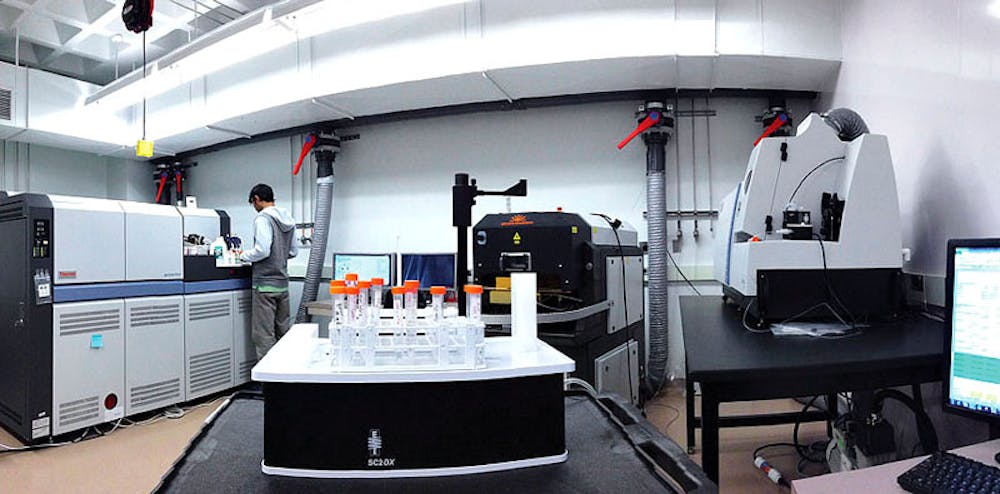As the national climate emphasizes putting more resources toward the disciplines of science, technology, engineering and mathematics, some critics have questioned the career opportunities for students in these fields after they graduate. But Brown students and faculty members said they did not notice a shortage of jobs in STEM fields.
Technology in particular continues to provide opportunities for students aiming to join the industry.
The last few years have heralded an uptick of Brown students interested in tech jobs, because of the “excitement, energy and money being put into tech right now,” said Andrew Simmons, CareerLAB director.
Though a recent article from the Institute of Electrical and Electronics Engineers argues the estimated 227,000 STEM jobs that open up every year are not enough to accommodate demand, faculty members and administrators in fields such as computer science and engineering said most students have not faced significant difficulty in finding employment.
“I think for the vast majority of our students, they have not had a particularly tough time getting jobs,” said Tom Doeppner, associate research professor and vice chair of the computer science department, adding that students receive multiple offers each year.
Doeppner said the University is widely regarded as one of the top computer science schools in the country and is one of only 17 schools in the country that Facebook recruits from, he said.
“There is still a shortage of people with technical qualifications for the number of jobs in the broad computer industry,” he added. Doeppner said financial companies also place high value on students with technical skills.
“Different branches of engineering have different needs for young engineers,” said Lawrence Larson, dean of the School of Engineering. “All of our students have had really good luck getting great jobs when they graduated.”
Larson said during his time at Brown, job prospects for engineers and students in STEM fields have steadily improved, reflecting growth in the country’s economy.
Though physics has never “had the incredible highs of engineering and computer science,” graduates have found jobs in academia, finance, startups and education that all made use of physics, said Professor of Physics Robert Pelcovits.
Pelcovits said employers value physics concentrators’ ability to “analyze and model complex systems,” he said. The only concentrator now involved in a totally unrelated field is a student who plays for the Canadian American baseball league, he added.
The STEM job search
The University provides several opportunities for students in STEM fields to find jobs, Simmons said, citing career advisers, an alumni series for students in science, on-campus recruiting and the January CareerLAB fair.
Individual STEM departments also offer internal programs for students seeking jobs.
Margaret Baxter ’14, an electrical engineering concentrator, said she did not use the CareerLAB and instead searched for jobs through the engineering department. She said that in engineering, resumes and cover letters are less relevant than the practical interview process. Baxter said her classes left her feeling well-equipped for these interviews, adding that they taught her “more how to think.”
Baxter said because engineering is an industry with such high barriers to entry, it is not as difficult for qualified people to acquire jobs in the field. She said she noticed many people incorporating the skills they learned in engineering to jobs in different fields.
“I feel like I’m very adequately prepared for different positions,” said Theresa Anderson GS, a graduate student in mathematics, adding that her academic adviser also helped her prepare for a job in academia.
Some students said they noticed a certain degree of sexism in the hiring processes for STEM field vocations.
“I had old white men interviewing me, and I kind of felt talked down to at times,” Baxter said.
But Anderson said she found a more supportive climate.
“I didn’t think too much about it,” she said.
Long-term employment
STEM employees deal with “fast-moving, fluid sectors,” meaning people can shift jobs frequently, Simmons said. “It’s important if you want to continue to grow as an individual.”
Anderson said she knew of many positions that could provide long-term STEM employment.
Though some students in STEM fields pursue graduate school, she added that “people get fed up with the academic track and leave and go into industry.”
She said the process of getting into grad school and acquiring an academic job is extremely competitive and consists of many rigorous steps, making it a less attractive long-term option for some students.
“Each step of the line you’re going to be judged,” she added.
Because of recent growth in the economy, grad school entry has dipped, while more students have found jobs after graduating, Simmons said. This does not account for gap years, and the range of data between years is not high, he added.
“(My adviser told me to) keep doing what you love until you don’t want to anymore, and you’ll figure it out — you can’t think too far ahead in the future,” Anderson said.

ADVERTISEMENT




